Student loans without cosigner are monetary aid options for students who do not have a creditworthy individual to act as a co-signer on their loans with cosigners.
Some of the best offers for student loans without a co-signer include the popular and easily accessible federal student loan. Another option for college and university students is the private student loans available with some reputable creditors.
It is essential to compare the terms and interest rates of different loan options and to understand the payment expectations before taking out a loan. Here, we’ll discuss some of the best offers and what to consider before choosing one.
Student Loans Without a Co-Signer: Best Offers
We understand you might find it difficult to reach a final decision here. There are many differences in loan offers between loan amounts, credit score, interest rates, etc. However, we’ve compiled this comprehensive list to aid you in your mission to find the most suitable option.
Hence, we’ve curated a list of some of the best student loans without a co-signer. Take your time to assess each offer and compare its features before deciding.
| Lender | Amount | APR |
| Federal Subsidized/Unsubsidized | $3,000 – $138,500 | 4.99% – 7.54% |
| Funding U | Up to $20,000 | 7.49% – 12.99% |
| A.M. Money | $2,000-$50,000 | 7.53-8.85% |
| Edly | Up to $25,000 | 5.8% |
| MPOWER | $2,001 – $25,000 per semester | 13.72-15.01% |
| Citizens | $1,000 – $350,000 | 4.9%-13.47% |
| LendKey | Up to 100% cost of attendance | 4.89% – 5.21% |
Read Also: How to Save Money as a College Student (Easy Ways to Practice)
Federal Subsidized/Unsubsidized Loan
The federal direct loan program is a combination of both subsidized and unsubsidized loans. Although they are similar, they both have their differences. For example, any student who qualifies for a subsidized loan tends to pay less overall than those who take unsubsidized loans.
The reason is that subsidized loans often allow an undergraduate to avoid interest ascent while they are still in school, which makes it a good way to avoid paying extra fees.
Loan amount: $3,000 – $138,500
Interest rate: 4.99% – 7.54%
Minimum score: None
Requirements: Undergraduate students, graduates, and professionals enrolled at eligible degrees, demonstrated financial need, U.S citizens.
Pros
- They have fixed interest rates.
- Lower overall charges and payments than private loans.
- Potential loan forgiveness.
- Feasible eligibility requirements for application
- The repayment plan before leaving college can be income-driven.
Cons
- It may not cover all expenses.
- Defaulting payments can have serious consequences.
Funding U Private Student Loan
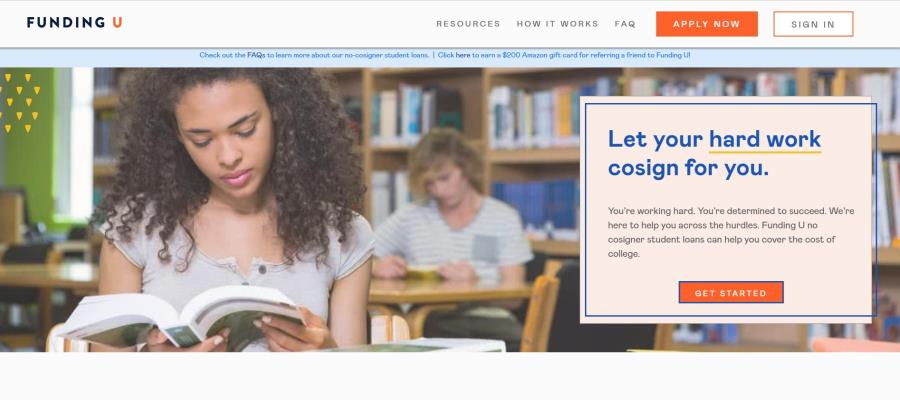
The Funding University (Funding U) is one of those few places a student can get extra funds without a co-signer. The system doesn’t use credit scores to make its lending decisions, which is good news for students. The approval process rather depends on academic success, graduating time, and projected earnings post-graduation.
Although it’s available for most students, the rules can be stricter for first- and second-year students. Students can sort almost all their education bills with the $20,000 maximum loan amount. You must, however, be a resident of approved states and meet a minimum GPA.
Loan amount: Up to $20,000
Interest rate: 7.49% – 12.99%
Minimum credit score: None
Requirements: Verifiable income, U S citizen, work-eligible SSN, enrolled at least half-time.
Pros
- Feasible eligibility requirements for application.
- No co-signer or credit history required to secure a loan.
- Only pull hard credit checks for approvals.
Cons
- Cash advances must be repaid while in school.
- Only available in certain states.
A.M. Money Private Student Loan
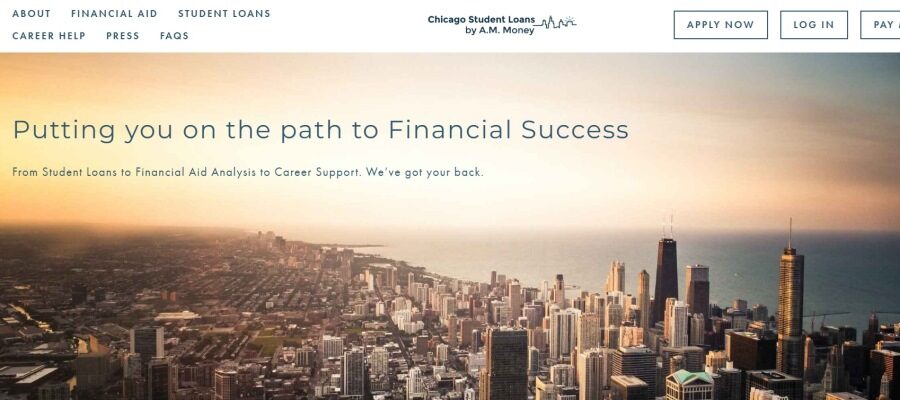
A.M. is one of the top lenders with an exciting selling point. It offers an impressive loan option for a student. And like Funding U, the process is rather special. Rather than focus on credit scores and co-signers, students can determine their creditworthiness.
It uses a combination of academic performance to grade students. The payment period can extend up to 36 months after the student graduates. Thanks to the fixed state of interest rate at A.M. Money, everyone gets fairly equal loan treatments when repaying.
Loan amount: $2,000-$50,000
Interest rate: 7.53-8.85%
Minimum credit score: None
Loan requirements: U.S. citizens and borrowers attending a certain school must be half-time or full-time students.
Pros
- It uses GPA for confirming eligibility status and interest ascent instead of credit score and a co-signer.
- It allows you to repay in up to 36 months.
- Offers a fixed rate for all borrowers.
- Offers fair interest rates
Cons
- Only available in certain schools.
- Can charge you extra payments (origination fee).
Edly Private Student Loan
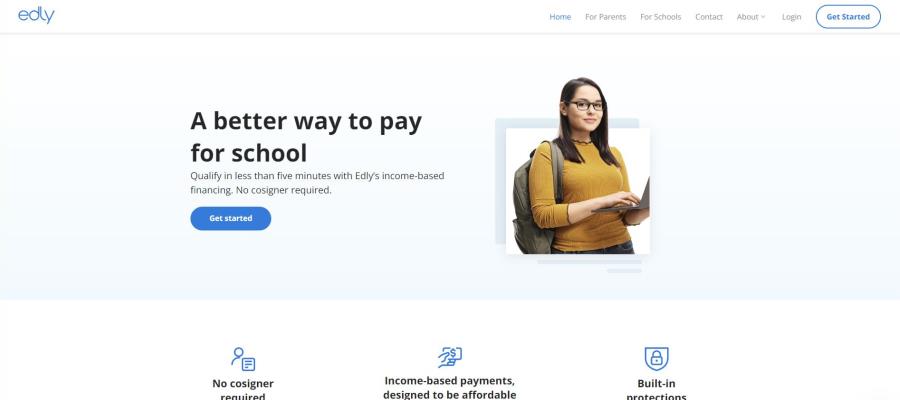
Edly is one of the partners of FinWise Bank. The credit company allows students to repay with their income, so they can graduate from school before starting their repayment journey.
Edly offers its services to undergraduate college and university freshmen and seniors. It’s also available for eligible graduates in over 1,700 colleges and universities across the United States.
The lender allows you to receive up to $25,000 to sort your education. However, it would help if you were two years away from graduation. This means you won’t be able to access it as a first- or second-year student, depending on your program. Like many similar student loan options, you don’t need a co-signer to get extra cash from Edly.
Loan amount: Up to $25,000
Interest rate: 5.8%
Minimum credit score: None
Loan requirements: 2 sessions from graduation, U.S. citizen, enrolled half-time or more, the minimum projected salary of $30,000, 36% maximum debt-income-ratio.
Pros
- No credit history is needed for approval.
- An undergraduate student without a co-signer can easily get a loan here.
- Doesn’t require extra payments if the borrower has less than $30,000 annual earning potential.
Cons
- Borrowers will have to repay extra amounts for early payoff.
- First- and second-year students don’t have access.
MPOWER Private Student Loan
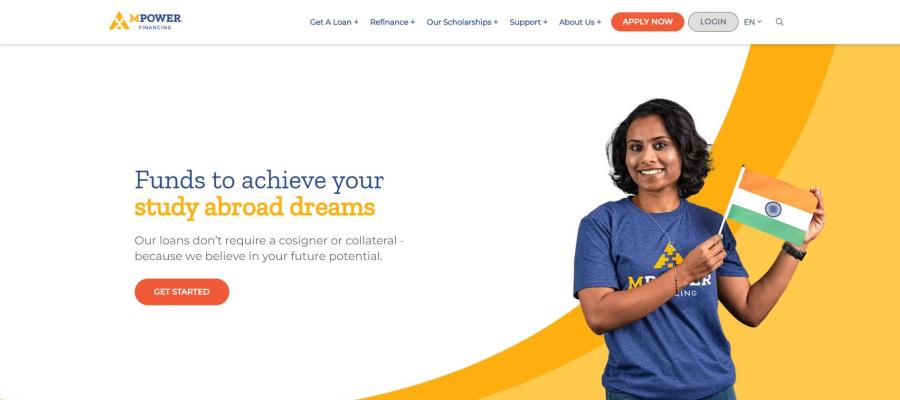
MPOWER Financing is another valuable loan provider for a typical college student. Its service targets undergraduate juniors and seniors. It remains one of the best options on the table, especially for international and DACA students. So, you can borrow up to $25,000 per semester. But this must be at most the maximum of $100,000 annually.
Without the need for a co-signer, students don’t need credit scores for approval here as well. There is a flexible payment schedule that’s beneficial for many borrowers. By using borrowers’ earning potential, MPOWER can overlook the U.S. financial history for international students.
Loan amount: $2,001 – $25,000 per semester.
Interest rate: 13.72-15.01%
Minimum credit score: None
Loan requirements: An international student must be from 180 MPOWER countries. Half-time enrollment required. Must attend a 4-year program.
Pros
- Offers feasible options for international and DACA students.
- Borrowers get a loan advisor for counseling.
- Feasible eligibility requirements for application
- A 2 years forbearance request available, which is more than that of many lenders.
Cons
- Doesn’t have a flexible repayment term. Only 10 years offer.
- Borrowers must make full payments in school or before the grace period elapses.
Citizens
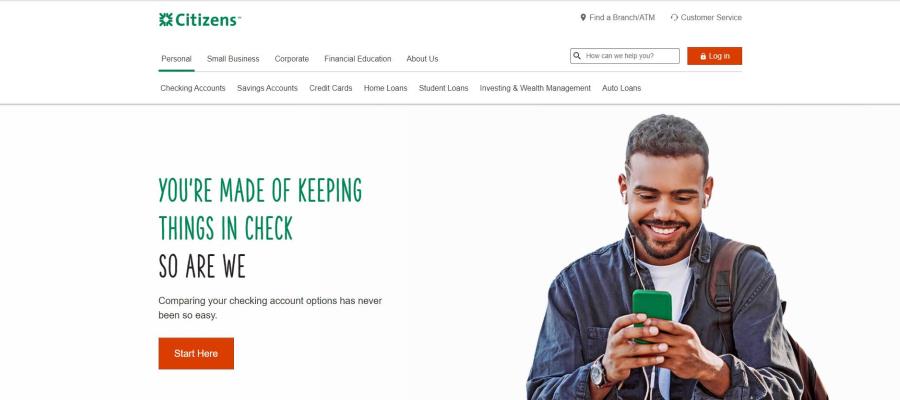
Citizens Bank is a student loan provider with some impressive offers. The lender offers private Cash advances that extend up to $350,000 for any undergraduate. Its cash advances are also available to international students. Any student can qualify without a co-signer if they maintain a clean financial history.
It offers a grace period of 6 months after school, and repayment can extend up to 15 years after school. This is one of the best options for borrowers with a good financial history. It’s also good for anyone needing multiple years of funding.
Loan amount: $1,000 – $350,000
Interest rate: 4.9%-13.47%
Minimum credit score: None
Loan requirements: Enrolled in a degree program. Zero prior student loan defaults. Be above 18. Lastly, you must also have an established credit history.
Pros
- Approval can last for multiple years.
- Gives loyalty discounts for previous debts.
- Available to an international student.
Cons
- It has limited eligibility information.
LendKey
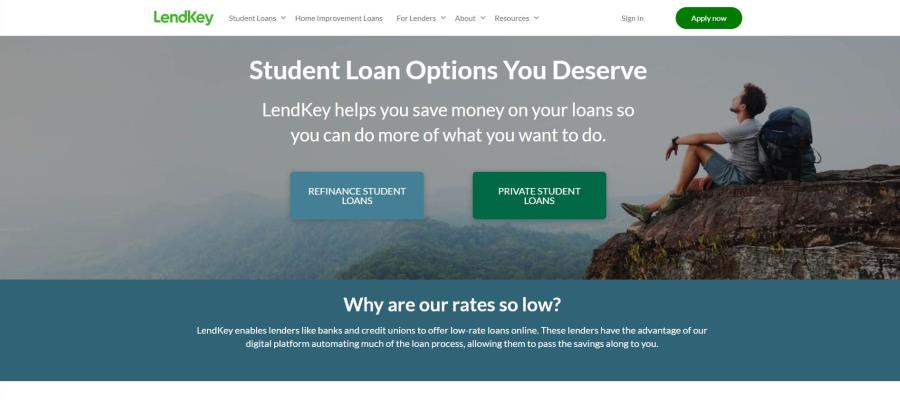
This is a student loan provider with private and refinancing options available. Lendkey allows undergraduate students to submit a single form and access multiple lenders on its platform. So, students can borrow as much as it costs to attend a specific school. It doesn’t require a co-signer as well. But you might need one if you still need to get a profound financial history.
Loan amount: Access to up to 100% of the cost of attending the college or university
Interest rate: 4.89% – 5.21%
Minimum credit score: None
Loan requirements: Earning at least $24,000 annually. 36 months of credit history. Be a U.S. citizen or permanent resident of the country. Enrolled in half-time or more. Must be the age of majority in their state.
Pros
- Students can access as much as their total attendance cost.
- Connects a student with many lenders.
- Offer a 6-month grace period after school.
Cons
- Offers one repayment term of 10 years.
- Not available for international students.
What Are Student Loans?
Student loans are typically any type of loan that is specifically designed to help a student sort their education bills. You can use them to cover various educational expenses such as books, tuition, books, etc. There are two main types of student loans available. These are federal and private.
Federal student loans are issued by the government and usually have lower interest rates, while banks and other financial institutions give private student cash advances.
You can apply for a student loan through the government or private lenders, and the loan amount will be based on your economic needs, cost of attendance, and other factors.
How Student Loans Work
A student loan is extra cash you can access to pay off your education bills. It works just like any regular loan. However, it’s specifically designed for students, so certain benefits exist. Due to the inability of many students to make an income, loans are often less sophisticated than mortgages and personal cash advances.
Like every other type, interest is accrued on your borrowed fund. The interest is often low, though. The first few payments go into settling the interests before the principal follows. This type of credit can affect your credit score too. So, you should be careful not to dent your credit history.
Read Also: Interview with Travis Hornsby, CFA
Eligibility Requirements For Student Loans Without Co-Signer
Depending on which type of loan you seek, you might need to meet different eligibility requirements for application. While federal sums often have general requirements, private cash advances rely on the lender’s rules. However, below are some of the basic requirements to qualify for an undergraduate student loan:
- Enrolled in an eligible program: Whether federal or private loans, you must be enrolled in an eligible degree program for consideration. You can only access a student loan if you’re a student.
- Loan for Educational Purposes: The sole intent of your request must be for educational bills. Different lenders might have a diverse range of educational purposes. But you must intend to use the loan for your education.
- Good Credit History: Although many lenders can waive this, it’s still quite significant. Any student who wants to apply for a loan must show they have a good financial history.
- Verifiable Income: You might also need to provide a verifiable income stream for eligibility. This is not necessarily a full-time job or any job at all. It’s just a means of income to prove that you can repay the loan.
- Demographics: Depending on your location, there are certain limitations on age. It would help if you were 18+ years and a citizen of the United States.
How To Apply For A Student Loan Without A Co-Signer
Applying for a student loan without a co-signer can be more challenging, but it is still possible. Here are some steps you can take:
- Gather all the necessary information and documents. This includes your social security number, tax returns, and proof of income.
- Research different loan options. Look into various types like federal student loans. Consider other alternatives like private student loans and explore the possibilities of a scholarship.
- Fill in the Free Application for Federal Student Aid (FAFSA). You must fill out this form to be considered for federal student loans.
- Check your credit score and work on improving it if necessary. A buoyant credit score will boost your chances of getting approved for a loan.
- Apply for private student loans without Co-signer. Some private lenders may require a cosigner, but others do not. So make sure you apply to the right one.
- Compare loan offers. Consider the interest rates, minimum score requirement, repayment terms, grace period in school, and extra payments before deciding.
- Accept the loan and start using the funds to pay for your education.
Read Also: Best Student Loans for Bad Credit
Can I Get Student Loans With No Credit Check and No Co-Signer?
Yes. Getting a loan without a credit check or co-signer is possible, but it may be more difficult. Here are some of the best options if you need to:
- Federal student loans: You can apply for a federal student loan without a credit check or co-signer.
- Income-Driven Repayment Terms: If you already have a federal student loan, you can apply for Income-Driven Repayment Terms. This will lower your payments based on income and does not require a credit check or co-signer.
- Payday loans: Some payday lenders do not require a credit check or co-signer. However, these loans have very high-interest rates and should be used cautiously.
- P2P lending: Peer-to-peer lending platforms like Lending Club and Prosper may not require a credit check, but you need a good credit score.
- Community organizations: Some organizations may offer small loans without a credit check or cosigner.
It’s important to remember that they may have more stringent requirements, such as income, and may also come with higher interest rates. Before taking out any loan, consider all of the best offers and consider their terms and conditions.
Tips for Comparing Student Loans Without a Co-Signer
In this section, we’ll cover the key factors to consider when comparing student loans and provide practical tips to help you make an informed decision.
- Look for the lowest interest rate possible, as this will determine how much you will pay back in the long run.
- Some loans may have extra payments, interest rate, application fees, or prepayment penalties. Compare these fees to find the best deal.
- Look at the time you have to repay the loan and the type of repayment plan offered.
- Make sure the loan you choose will cover the total cost of your education.
- Look at customer reviews and ratings of the lender.
- Some loans may require a cosigner, while others do not.
- Some loans may have forgiveness options for specific career fields or for those who meet certain income requirements.
Conclusion
While having a co-signer can make qualifying for a student loan easier, it is not the only option. Direct Subsidized and Unsubsidized Loans, which belong to the category of federal student loans, and private student loans from reputable lenders, can offer attractive features for students without a cosigner.
However, it is vital for a student to research and compare different loan options carefully and to understand the terms, interest rates, and repayment expectations associated with each loan.
Sources Used in Research for the Article:
- Types of student financial aid, USAGov, https://www.usa.gov/student-aid
- How do I find out information about my student loans, Consumer Financial Protection Bureau, https://www.consumerfinance.gov/ask-cfpb/how-do-i-find-out-information-about-my-student-loans-en-613/
- Student loans key terms, Consumer Financial Protection Bureau, https://www.consumerfinance.gov/consumer-tools/student-loans/answers/key-terms/#co-signer-release

